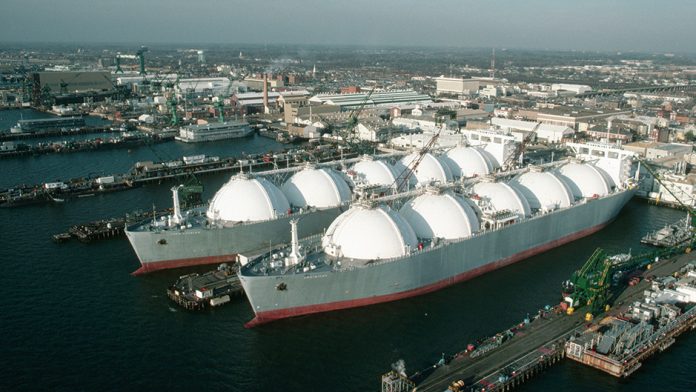The U.S. Energy Information Administration (EIA) reported in December that for the first time in history America’s oil and gas industry led the world in exports of liquefied natural gas (LNG).
A major reason for the surge was European “clean energy” policies that have left millions without reliable energy for homes and businesses, when wind currents failed on a widespread basis across the continent for extended periods of time.
In response Europe has increased its imports of U.S. gas through a growing number of LNG import terminals. This was helped along by the increase U.S. LNG terminals and capacity developed during the Trump administration.
The shale gas revolution, sparked by hydraulic fracturing (fracking), along with billions of dollars of investments in liquefaction facilities, enabled a 70-percent increase in U.S. gas production since 2010. Average utilization for U.S. LNG export facilities climbed from 43 percent in third quarter 2020 to 98 percent in third quarter 2021.
Increasing U.S. Capacity
As of November 2021, the U.S. Energy Information Agency estimated U.S. LNG nominal liquefaction capacity was 9.5 billion cubic feet per day (Bcfd) and peak capacity was 11.6 Bcfd. The peak capacity stems from a growth in LNG production capacity at LNG plants and terminals in Sabine Pass, Louisiana and Corpus Christi, Texas.
By optimizing operations and modifications to maintenance, LNG terminals in Sabine Pass and Corpus Christi improved their capacity, seeking and receiving permission from the U.S. Federal Energy Regulatory Commission (FERC) to increase allowable exports in November.
By the end of 2022, when Venture Global LNG’s Calcasieu Pass, Louisiana terminal is expected to come online, the U.S. will have the world’s largest LNG export capacity, at 11.4 Bcfd nominal and 13.9 Bcfd peak.
Also in 2024, if the construction on Golden Pass LNG, on Texas’ Gulf Coast, is completed and the facility begins operations, U.S. LNG peak export capacity will further increase to an estimated 16.3 Bcfd.
The United States currently has seven LNG export terminals in operation. The FERC has approved four other export terminals that are currently in various stages of construction, and an additional 13 terminals have been approved by the FERC but construction has yet to begin.
Threats to U.S. Gas Dominance
America’s leadership position may not last long.
United States LNG exports face fierce competition from Qatar, historically the world’s leading exporter, and Australia.
Qatar is planning a major expansion of its own capacity, scheduled to come online in the late 2020s.
Simultaneously, gas production on federal lands and offshore is being hampered.
A federal judge recently blocked the sale of Gulf of Mexico drilling leases, stating the Biden Administration had not properly considered the leases’ climate change impacts in the required Environmental Impact Statements. Additionally, the Biden administration stalled new leases on public land for most of President Joe Biden’s first year in office, by imposing January 2021 moratorium new leases federal lands that the administration eventually rescinded after a federal judge ruled it illegal. In addition, in November 2021 the Biden administration proposed new methane emission rules that will make new and existing oil and gas production and transportation more expensive.
‘Natural Gas a Global Commodity’
The helter-skelter Biden energy policy, together with the United Kingdom’s prohibition on domestic drilling and other actions by European nations, have effected a subtle wealth transfer from Europe to the United States, says Robert Bradley, Jr., Ph.D., founder and CEO of the Institute for Energy Research.
“The current tripartite boom in oil, gas, and coal are refuting the notions of ‘peak demand’ and ‘net zero’ for our lifetimes,” said Bradley. “Record LNG shipments from the U.S. and elsewhere are making natural gas a global commodity, joining oil and coal, making the world an interconnected energy market which undermine the anti-fossil-fuel policies of some governments.”
‘Enormous Energy Production Potential’
Natural gas has a big role to play even in a renewable-energy friendly environment, and the U.S. is well positioned as a world leader if U.S. policymakers reverse their assault on fossil fuels, says Ed Longanecker, president of the Texas Independent Producers and Royalty Owners.
“Europe’s energy crisis, like that in Boston, Massachusetts, which has banned new gas pipelines, is the direct result of irrational energy policy, with both Boston and the E.U. now relying on much dirtier Russian natural gas,” Longanecker said. “On average, U.S. LNG produces about 50.5 percent less emissions when used for power generation in contrast to China, India, and Germany, which are dramatically increasing their use coal.
“U.S. LNG is significantly cleaner than Russian natural gas, because Russia’s flaring intensity is 143 percent higher than the United States average, and 239 percent higher than in the Texas Permian Basin,” Longanecker said.
Government suppression of the market is the only thing that could realistically prevent natural gas from dominating energy supplies is the coming decades, says Longanecker.
“Natural gas can served as a foundation of our future energy mix, because the United States in general and Texas, in particular, have enormous energy production potential,” Longanecker said. “Right now that energy potential is being suppressed, but is nowhere near being stopped.
“If the Biden Administration and policymakers on Capitol Hill embraced oil and natural gas as they should, America would be a truly unbeatable energy powerhouse,” said Longanecker.
Duggan Flanakin (dflanakin@gmail.com) writes from San Marcos, Texas.



























[…] post The United States is the World’s Largest LNG Exporter, For Now appeared first on Heartland Daily […]